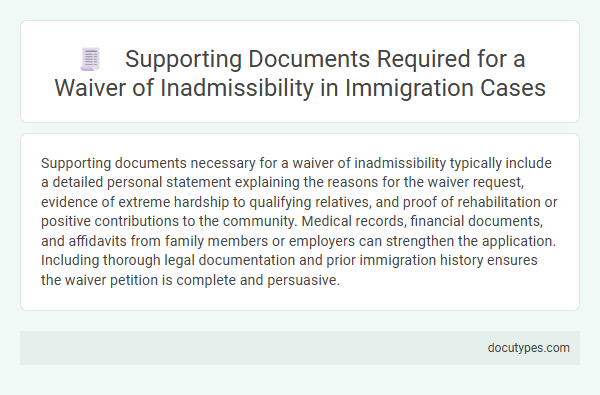Supporting documents necessary for a waiver of inadmissibility typically include a detailed personal statement explaining the reasons for the waiver request, evidence of extreme hardship to qualifying relatives, and proof of rehabilitation or positive contributions to the community. Medical records, financial documents, and affidavits from family members or employers can strengthen the application. Including thorough legal documentation and prior immigration history ensures the waiver petition is complete and persuasive.
Overview of Waiver of Inadmissibility
| Overview of Waiver of Inadmissibility | |
|---|---|
| Definition | A Waiver of Inadmissibility allows individuals who are otherwise inadmissible under U.S. immigration law to enter or remain in the country by overcoming specific grounds of inadmissibility. |
| Purpose | To provide relief for applicants facing barriers such as criminal history, health issues, or immigration violations that would prevent lawful entry or adjustment of status. |
| Eligibility | Applicants must demonstrate extreme hardship to a qualifying relative, create strong equities, or meet other waiver-specific criteria outlined by U.S. Citizenship and Immigration Services (USCIS). |
| Common Grounds of Inadmissibility | Includes unlawful presence, criminal convictions, fraud or misrepresentation, certain health-related grounds, and security-related issues. |
| Relevant Immigration Forms | Form I-601 (Application for Waiver of Grounds of Inadmissibility), Form I-601A (Provisional Unlawful Presence Waiver), Form I-212 (Application for Permission to Reapply for Admission). |
| Processing Authority | U.S. Citizenship and Immigration Services (USCIS) and Department of State handle waivers depending on the application context and location of the applicant. |
Importance of Supporting Documents
Supporting documents are critical for a waiver of inadmissibility, serving as proof of eligibility and strengthening the case. Detailed evidence such as medical records, financial statements, and affidavits demonstrate hardship and compliance with immigration laws. Properly organized and credible documentation significantly increases the chances of approval.
Identity and Civil Status Documents
Supporting documents for a waiver of inadmissibility are critical in establishing the applicant's identity and civil status. Accurate and thorough submission of these documents can significantly impact the approval process.
- Passport or National ID - These documents confirm the applicant's nationality and personal identity details.
- Birth Certificate - Provides proof of age, parentage, and can link related family members.
- Marriage Certificate - Verifies marital status and is essential when spousal relationships are relevant to the waiver application.
Providing clear and authentic identity and civil status documents supports the waiver application and helps avoid delays.
Evidence of Family Relationships
Evidence of family relationships is crucial when applying for a waiver of inadmissibility to demonstrate the hardship your relatives would face. Proper documentation establishes the legitimacy of close family ties required by immigration authorities.
- Birth Certificates - Official birth certificates confirm biological relationships between the applicant and immediate family members.
- Marriage Certificates - Marriage certificates verify the legal union between spouses, essential for spousal waivers.
- Affidavits from Relatives - Sworn affidavits provide personal testimony supporting family relationship claims when official documents are unavailable.
Medical and Health Records
Medical and health records are critical for a waiver of inadmissibility, especially when health-related grounds are involved. These documents provide evidence of your current medical condition and the potential impact of inadmissibility on your well-being.
Supporting records may include detailed physician reports, diagnostic test results, and treatment histories. Accurate and thorough medical documentation strengthens the case by demonstrating the necessity of the waiver on health grounds.
Proof of Rehabilitation and Good Moral Character
Proof of rehabilitation is essential for a waiver of inadmissibility, demonstrating that the applicant has reformed past behavior contributing to inadmissibility. Evidence of good moral character supports the claim that you have positively changed and are worthy of approval.
Supporting documents may include police clearances, letters of recommendation from community leaders, and records of participation in rehabilitation programs. Court records showing completion of sentences or payment of fines also serve as strong evidence. Personal affidavits describing lifestyle changes and community involvement help establish good moral character for waiver approval.
Financial Support and Employment Documentation
Financial support documentation is essential for a waiver of inadmissibility to prove the applicant can sustain themselves without public assistance. Key documents include recent pay stubs, tax returns, bank statements, and affidavits of support from sponsors. Employment verification letters detailing job title, salary, and duration of employment strengthen the case by demonstrating stable income.
Hardship Evidence for Qualifying Relatives
When applying for a waiver of inadmissibility, submitting comprehensive hardship evidence is crucial for supporting qualifying relatives. These documents demonstrate the emotional, financial, and medical difficulties they would face if the waiver is denied.
Common evidence includes medical records showing health conditions that require ongoing care, financial statements proving economic dependency, and personal affidavits describing emotional hardship. Legal briefs or expert opinions detailing the impact on the qualifying relatives may also strengthen the case significantly.
Court and Criminal Records
Submitting a waiver of inadmissibility requires thorough documentation, including court and criminal records to establish the applicant's background. Accurate and complete records help immigration authorities assess eligibility and the nature of any offenses.
- Court Records - These documents must detail the charges, case outcomes, and sentencing related to any criminal conduct relevant to the waiver application.
- Certified Criminal Records - Official police reports or criminal history extracts from relevant jurisdictions verify the existence or absence of convictions.
- Disposition Documents - Records showing how each case was resolved, such as dismissals, probation, or completed sentences, are critical for demonstrating compliance with legal obligations.
Which Supporting Documents Are Necessary for a Waiver of Inadmissibility? Infographic

